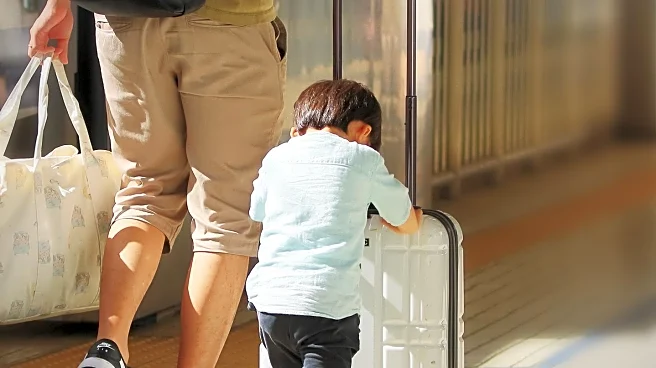What's Happening?
In South Korea, a series of attempted child abductions has led to a significant increase in the demand for self-defense products among parents. Online marketplaces have reported a sharp rise in sales of personal safety items. According to the e-commerce platform 11st, purchases of key safety items surged 2.5 times between September 2 and 11 compared to the previous month. This increase followed news of an attempted abduction near an elementary school in Seoul's Seodaemun District. Sales of personal alarms, defense sprays, and items like batons and locks have seen substantial growth. Additionally, sales of safety whistles spiked more than sevenfold in a single day on another major open market. The heightened anxiety is also reflected in search data on Naver, with a 32 percent increase in queries for self-defense goods. In response, authorities have taken steps to reassure parents, including deploying over 55,000 police officers nationwide to patrol routes around elementary schools during start and dismissal times.
Why It's Important?
The surge in demand for self-defense products underscores the growing concern among South Korean parents regarding child safety. This trend highlights how fears over child abductions are influencing consumer behavior, with parents increasingly investing in safety measures to protect their children. The government's swift response, including increased police presence and urging schools to ensure children walk with guardians, reflects the seriousness of the situation. This development could lead to a broader societal shift towards heightened vigilance and the adoption of technology for child safety, such as location-tracking devices. The situation also raises questions about public safety and the effectiveness of current measures in preventing such incidents.
What's Next?
Authorities are likely to continue monitoring the situation closely and may implement additional security measures if necessary. The increased police presence around schools is expected to remain in place as a deterrent to potential abductors. Parents may continue to seek out new technologies and products to ensure their children's safety, potentially driving further innovation in the self-defense market. The government may also consider launching public awareness campaigns to educate parents and children on safety practices. Additionally, there could be discussions on legislative measures to enhance child protection and prevent future abductions.
Beyond the Headlines
The recent events in South Korea may prompt a reevaluation of child safety protocols and the role of technology in ensuring security. The reliance on self-defense products and technology could lead to ethical debates about privacy and the balance between safety and surveillance. Furthermore, the incidents may influence cultural attitudes towards community responsibility and the collective role in safeguarding children. Long-term, this could result in a more proactive approach to public safety and community engagement in preventing crime.











